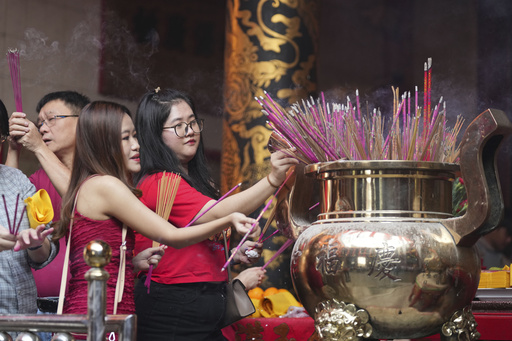
YANGON, Myanmar — Amidst ongoing civil strife between supporters and adversaries of Myanmar’s military regime, a celebration was held on Wednesday to honor a cultural tradition that many citizens cherish: the use of thanakha, a natural cosmetic made from ground tree bark. This yellowish-white paste is frequently smeared on the cheeks, as well as the nose, forehead, neck, forearms, and shins, making it a common sight among women and children throughout the country, with men also participating in the practice. The tradition is set to receive international recognition as Myanmar pursues a listing for thanakha with UNESCO’s Intangible Cultural Heritage.
Thanakha has cultural roots believed to stretch back more than a millennium, with historical murals depicting its application found in the ancient temples of Bagan, recognized as a UNESCO World Heritage site. This cosmetic derives from the bark of specific tropical sandalwood trees that thrive in Myanmar’s central dry zones, which are currently the center of armed opposition to military authority. Interestingly, those opposing military governance have embraced thanakha as well; during the early protests against the military’s 2021 takeover from the elected administration led by Aung San Suu Kyi, demonstrators often painted symbols on their faces with the paste.
On Wednesday, a diverse group comprising 36 social organizations, ranging from young children to elderly citizens, gathered in a park in Yangon, the largest city in Myanmar. They celebrated thanakha as a cultural emblem by participating in contests featuring traditional songs and dances. Various stalls around the performance area offered chopped thanakha wood and cosmetics derived from the paste for sale.
Sandar Khin, the chairperson of the Myanmar Cultural Heritage Trust, which helped organize the event, stated that the competition aimed to elevate the profile of thanakha and ensure its cultural significance is recognized worldwide. Initially, an application to UNESCO for inclusion of thanakha on the Intangible Cultural Heritage list was put forth in March 2020, but the submission was deemed inadequate and subsequently rejected. The Ministry of Religious Affairs and Culture under the military government is currently working toward resubmitting a complete nomination by the end of March.
Achieving UNESCO recognition would mark thanakha as Myanmar’s second entry in the intangible cultural heritage category, following the inclusion of the country’s traditional water festival, Thingyan, which received acknowledgment last December. Additionally, Myanmar has designated the full-moon day of Tabodwe, corresponding to the 11th month in the traditional calendar, as “Myanma Thanakha Day.”

